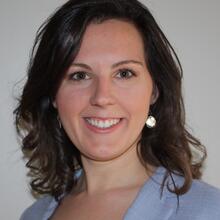The morning after the second inauguration of Donald J. Trump, Bishop Mariann Edgar Budde of the Episcopal Diocese of Washington, D.C., put him on notice: “In the name of our God, I ask you to have mercy, Mr. President,” she implored.
Mentioning specifically immigrants and members of the L.G.B.T. community who were targeted by freshly signed executive orders, Bishop Budde reminded Mr. Trump that people are scared and vulnerable, and that compassion and welcome are the way of the Gospel. She asked God to “grant us the strength and courage to honor the dignity of every human being, to speak the truth to one another in love and walk humbly with each other and our God for the good of all people, the good of all people in this nation and the world.”
Bishop Budde delivered her sermon at Tuesday’s inaugural prayer service in light of the executive orders Mr. Trump signed immediately after taking office. While most were not surprises—they had been campaign promises—their actual implementation hit hard. To name a few, Mr. Trump withdrew from the Paris Climate Agreement, rolled back regulations on fossil fuel extraction, promoted the use of the death penalty at both the federal and state level, ended refugee and asylum admissions, sent more troops to the southern border, ended the Constitution’s guarantee of birthright citizenship (though this is now suspended in court), began preparing for militarized mass deportations, rescinded the sensitive locations policy that recognized houses of worship as places of sanctuary for those in danger, and declared that the U.S. government will recognize only two, non-changeable genders. Those of us not directly targeted are still witnesses to the Trump administration’s attempt to essentially erase vulnerable communities.
Bishop Budde’s act of moral courage in the face of these attempts to further marginalize already vulnerable people is laudable and should inspire the rest of us—especially our pastors and bishops—to proclaim the dignity of all clearly and with conviction from our positions of influence. Statements like that of Bishop Mark J. Seitz, who urged Mr. Trump to “pivot from these enforcement-only policies to just and merciful solutions” are one way to do this, but it will also require explicit comment by clergy and lay leaders in homilies and other public reflections.
This is not without risk. Indeed, Bishop Budde reports that she and the National Cathedral are now the targets of intimidation and have received threats of violence. We can no longer pretend that those of us who are not directly targeted are outside of the crosshairs; we must use whatever privilege and authority we have to stand together against the new administration’s widespread assaults on human dignity, offering encouragement and protection to all who are vulnerable. It is worth reflecting on the fact that Jesus himself went to the cross for countering marginalization and oppression and subverting the authority of the state.
America’s Connor Hartigan has highlighted the ways in which our faith tradition is rooted in the prophetic witness of those who speak truth to power. And I hope our bishops and faith leaders will find the moral courage to continue this tradition.
One of my favorite examples in recent history of the prophetic nature of our tradition was actually directed toward the bishops’ conference. In 1989, Thea Bowman, F.S.P.A., in a speech at a meeting of the bishops, called out the U.S. Conference of Catholic Bishops for racism and paternalism in their institution. Expressing her love for her “brother bishops,” she nevertheless criticized them directly, saying, “They work for the people, but they have not learned to share life and love and laughter with the people,” particularly Black Catholics. In doing so, she invited them into deeper communion as the body of Christ.
This political moment, in which so many of our neighbors are justifiably fearful of the dangers threatening them and feel abandoned, has opened the wounds in the body of Christ. I believe the church has fallen woefully short in responding to Sister Thea’s challenge to disciple parishioners toward justice, compassion and solidarity, and away from white supremacy, patriarchy and individualism. Like Sister Thea, Bishop Budde has challenged us again with such integrity and conviction, and this should be an example to all clergy and faith leaders.
As the interim executive director of Network Lobby for Catholic Social Justice, Joan Neal, said to me on Thursday:
Bishop Budde displayed the prophetic leadership we need right now from all of our religious leaders. She reminded the president of his responsibility to care for all people, without exception, in accordance with our God-given dignity. The promise of this country, this democracy, is its capacity to offer freedom, health, security and opportunity for all people, no exceptions. All of our religious leaders, and indeed all people of faith, should follow her example, set by Jesus, to speak truth to power.
Michele Dunne, O.F.S., the executive director of the Franciscan Action Network, similarly told me: “What Bishop Budde did—appeal to an elected leader to be merciful toward people under his authority—was entirely appropriate for a faith leader to do, whether in public or private. Many saints, for example St. Catherine of Siena and St. Francis of Assisi, engaged with political leaders on moral issues.”
It is fitting that all of this is occurring in the week that we honor Rev. Dr. Martin Luther King Jr., a pastor who died for his conviction that a Christian faith that does not work to dismantle the systemic injustices of white supremacy, economic exploitation and militarism is a distorted faith. Bishop Budde took a risk to follow his lead. I hope our bishops, clergy and all faith leaders will follow hers.
[Read next: “Bishop Budde, Trump and the history of faith leaders getting political”]








